بهرام که گور میگرفتی همه عمر، دیدی که چگونه گور بهرام گرفت
بهرام عاشقِ دختری بود و چون در شکار با تیر قابل بود اون دختر رو میبرد با خودش شکار، که خودی نشون بده.
دختر یه حیوونی رو نشونه میده و و از بهرام میخواد تیرو بزنه وسط پیشونیش که بهرام هم اینکارو میکنه اما دختر میگه که شاهکاری نکردی و یه حیوون دیگه ای رو نشون میده و میگه باید تیر رو طوری بزنی که از گوشش رد بشه و به پاش برسه یعنی تیر، گوش حیوون و پاشو به هم وصل کنه.
بهرام هم صبر میکه که حیوون با پاش پشت گوششو بخارونه و همون لحظه تیر رو میزنه و تیر، گوش و پای حیوون رو بهم وصل میکنه، درست همون چیزی که دختر میخواسته.
اما باز دختر میگه که تو کار خاصی نکردی و بهرام رو عصبانی میکنه.
بهرام هم میگه من شاهم ، این چه طور با من اینطور صحبت میکه و دستور تبعید دختر رو به یه بیابونی میده.
مقام عالی رتبه ی بهرام که دستور اجرای تبعید دختر رو داشته، دلش به حال دختر میسوزه و اونو به جای بیابون توی یه مزرعه پیش یه خانواده میزاره.
دختر که میره کنار رودخانه آب بیاره میبینه یه گاوی داره زایمان میکنه و وقتی زایمان کرد گاو و از بچه جدا میکنن و گاو مادر رو میفروشن.
دختر هم دلش به حال بچه گاو میسوزه و اونو کول میکنه و از تپه بالا میاره به سمت کلبش.
گاوه هر روز بزرگتر میشه و دختر هم و اینکارو هر روز میکنه تا اینکه یکی از مقام های عالی رتبه ی بهرام از اونجا رد میشه و دختر رو میبینه.
خیلی تعجب میکنه که یه دختر یه گاو رو به کول میگیره و از تپه بلند میکنه و موضوع رو به بهرام میگه.
بهرام هم میگه باعث خوشحالیه همچین زن تنومندی در قلمرو منه، اون دختر رو نزد من بیارین تا ازش تقدیر کنم.
وقتی دختر رو نزدش میارن، بهرام فورا دختر رو میشناسه و میگه تو چطور گاو به این سنگینی رو بلند میکنی؟
دختر هم میگه همونطور که تو با تمرین مداوم در شکار ماهر شدی منم با انجام هر روز اینکار به این قدرت رسیدم که میشه ضربالمثل:
کار نیکو کردن از پر کردن است
توی نقاشی، بهرام رو میبینیم که توی دربارش اون وسط نشسته و دختر هم با گاو روی کولش این داستان رو بسیار زیبا بیان کرده
منبع مطلب: صحبت های راهنما ی موزه در بازدید من از موزه ملی ایران واقع در وزارت امور خوارجه - خیابان جمهوری

برچسبها: شخصی
شخصیت تاریخی مجبوب من، شاه عباس
در زمان شاه عباس به دلیل وجود جاده ی ابریشم، چینی ها خیلی نفع کردن چون میتونستن هرچی بخوان با جاده ی ابریشم به اروپا صادر کنن و برای تشکر یه عالمه ظروف چینی به شاه عباس هدیه میدن.
شاه عباسم همه ی این ظروف رو مهر میکه و هدیه میده به شیخ صفیالدین که تو مجموعه اش نگه داره.
مهرش توی عکس مشخص نیس، اما هنگام بازید در موزه ی ملی ایران این مهر هارو روی همه ی ظروف می تونین ببینیم که بصورت برجسته اس یعنی روی ظروف به صورت خیلی ظریف تراشیدن " شاه عباس وقف شیخ صفیالدین"
بعضی از این ظروف طرح اژدهارو داره که خیلی این طرح اژدها تو چین محبوبه، حالا اگه اژدها دستش پینج تایی باشه یعنی امپراتوره اگه سه تایی باشه یعنی شاهزادس اگه دوتایی باشه یعنی درجش کمتره.
یه مدل دیگه این ظروف هم هست که ساده ست یعنی کرم و سفیده ولی وقتی بهش دقت میکنی زیرش طرح و نقاشی هس.
منبع مطلب: صحبت های راهنما ی موزه در بازدید من از موزه ملی ایران واقع در وزارت امور خوارجه - خیابان جمهوری

برچسبها: شخصی
نقاشی نبرد گنجه
ایران با روسیه دو تا جنگ داشته که توی هر دوتاش شکست میخوره. این نقاشی این دو جنگ رو نشون میده که مال زمان فتحعلی شاه هست.
نقاشی به اینصورت مصورِ دو جنگه :
در قسمت پایین نقاشی،جنگ اول هس که ایران بسیار مقاومت میکنه و یه جورایی سربازای روس رو سرکوب میکنه ولی شکست میخوره.
در سمت راست و وسط ِنقاشی، امتداد جنگ رو نشون میده که در واقع جنگ دوم هس.
توی جنگ دوم ایران کلا شکست میخوره چون روس ها سلاح گرم داشتن و ایران فقط سلاح سرد.
در سمت راست بالای نقاشی میبینیم که نقاش، توپ های روس رو کشیده که نشونه ی سلاح گرم روس هاس.
وسط نقاشی، پسرِ فتحلیشاه روی اسبش هست به اسم عباس میرزا که بر خلاف پدرش، خیلی توی جنگ با جون و دل جنگید و زحمت کشید.(عکس دوم)
فتحلیشاه اصن توی این جنگ ها هیچکاری نکرد و فقط یه گوشه ایستاد و نگاه کرد اما چون نقاش ، از شاه پول میگرفته و این نقاشی به دستور شاه کشیده شده، واسه ی همین فتحعلی رو بزرگ سمت چپِ نقاشی روی اسبش کشیده انگاری که جنگ روی انگشتش میچرخیده ولی همه فتحعلی رو با زناش میشناسن و همه میدونن هیچ کاری نکرده.
نکته نقاشی اینکه نقاش با اینکه میدونسته همه از شکست ایران در برابر روس ها با خبرند اما نخواسته توی نقاشی شکستِ ایران رو نشون بده و بیشتر، مقاومت ایران رو نشون داده.
نکته دیگر اینکه با دقت به اسب فتحعلی میبینیم، نصف اسب به رنگ نارنجی هس که نشونه یکی از رسم های قدیمیه چون در قدیم، نصف اسب رو با حنا رنگ میکردن به نشانه ی خون و نویی آلایشِ جنگ بوده.
منبع مطلب: صحبت های راهنما ی موزه در بازدید من از موزه ملی ایران واقع در وزارت امور خوارجه - خیابان جمهوری

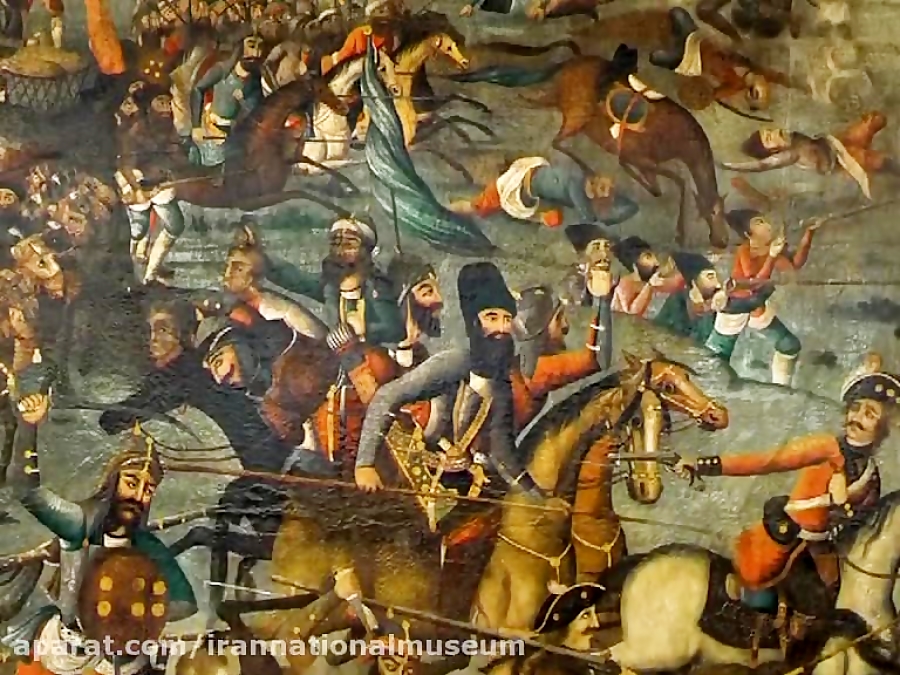
برچسبها: شخصی
موتور سواری توی خیابون ولیعصر به خصوص، تو خنکی و خوشرنگی هوای عصر رو خیلی دوس دارم.
یه نمه بارونم بیاد که بوی بارون و خاکِ بارون زده تو هوا پُر بشه، دیگه هیچی نمیخوام.
موتور سرعتی بره، بعد قطره های بارون بخوره به صورتم یا وقتی از کنار میریم، این برگ های درخت که خیسم شده بخوره بهم، دیگه اصن نمیخوام مسیر تموم بشه.
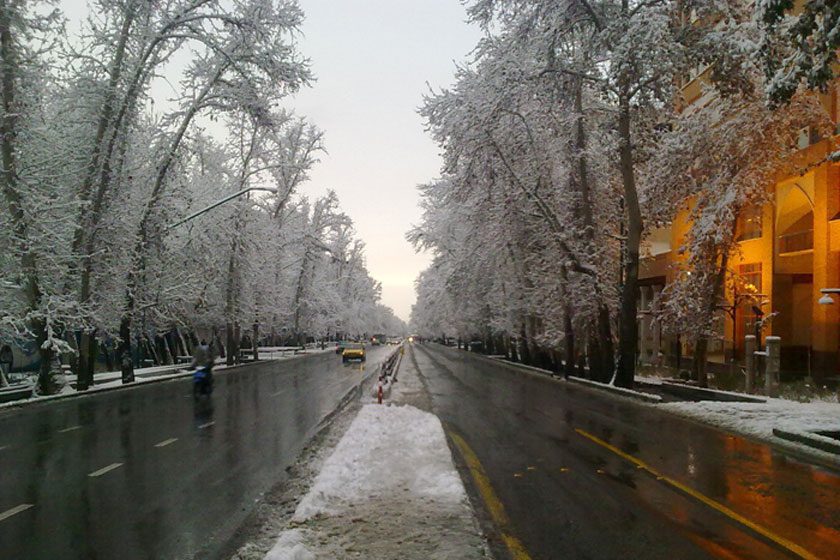
برچسبها: شخصی
کتاب شاهزاده خانوم محکوم
هنگامی که شاهزادهء روس و نامزدش برای خرید لباس وارد مغازه شدند، نامزدِ شاهزاده مقابل آینه ایستاد و از فروشنده که دختری فرانسوی بود، خواست تا در پرو لباس به او کمک و از شاهزاده پرسید " لباس چه طور است؟ "
شاهزاده به آینه نگاه کرد، نگاهش به نگاه دختر فرانسوی در آینه گره خورد، دختر فرانسوی چشمانش را فورا به زمین دوخت اما شاهزاده، همانطور که به چشمان دختر فرانسوی نگاه میکرد، گفت "بسیار زیباست"

برچسبها: شخصی
WOUND REPAIR
Active TROMBIN cleaves FIBRINOGEN into FIBRIN, which polymerizes into a fibrin network (SCAB) sealing the wound
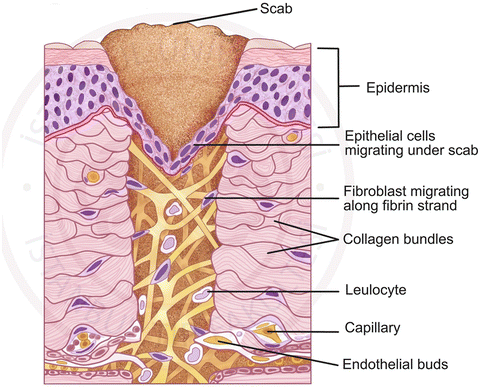
CAUSES OF TISSUE DAMAGE
Physical
Copromised blood flow
Crushing
Desiccation
Incision
Irradiation
Overcooling
Overheating
Chemical
Agent with unphysiologic PH
Agent with unphysiologic tonicity
Proteases
Vasoconstrictors
Thrombogenic agents
EPITHELIALIZATION
Injured epithelium has a genetically programmed regenerative ability that allows it to reestablish its integrity through proliferation, migration & a process known as contact inhibition
In general, any free edge of epithelium continues to migrate (by proliferation of germinal epithelial cells that advance the free edge forward) until it comes into contact with another free edge of epithelium, where it is signaled to stop growing laterally
Wounds in which only the surface epithelium is injured (e.g. abrasions) heal by proliferation of epithelium across the wound bed
Wounds in which the sub-epithelial tissue is also damaged proliferates across whatever vascularized tissue bed is available & stays under the portion of the superficial blood clot that desiccates (forms a scab) until it reaches another epithelial margin. Once the wound is fully epithelialized, the scab loosens and is dislodged
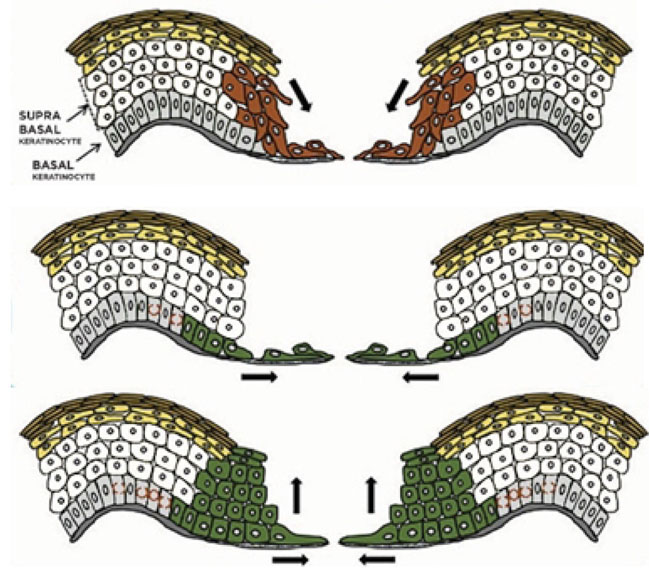
STAGES of WOUND HEALING
Inflammatory Stage
Fibroplastic Stage
Remodelling Stage
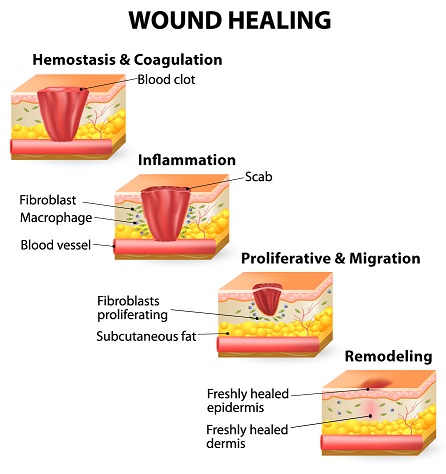
Inflammatory Stage
“Lag Phase” – the period where no significant gain in wound strength occurs.
Principal material holding together during this stage is fibrin.
Wound fills with clotted blood, inflammatory cells and plasma.
Adjacent tissue begins to migrate into wound, and undifferentiated mesenchymal cells begin to transform into fibroblast.
Immediate to 3-5 days
:(Bleeding stops (hemostasis
a. Constriction of blood supply
b. Platelets start to dot
c. Formation of scab
:Inflammation
a. Opening of blood supply
b. Cleansing of wounds
CARDINAL SIGNS OF INFLAMMATION
Redness – rubor
Swelling – tumor
Warmth – color
Pain - dolor
Loss of function
/signs-of-inflammation-4580526_FINAL-5c6f21adc9e77c0001be5177.png)
Fibroplastic Stage
Strands of fibrin, from blood coagulation, crisscross wound to form a latticework on which fibroblasts can begin laying down ground substance & tropocollagen
Occurs 5 days to 3 weeks
:Granulation
a. New collagen is laid down
b. New capillaries fill defects
:Contraction
a. Wound edges pull together
: Epithelialization
a. Cells cross over the moist surface
b. Cell travel about 3mm from point of origin
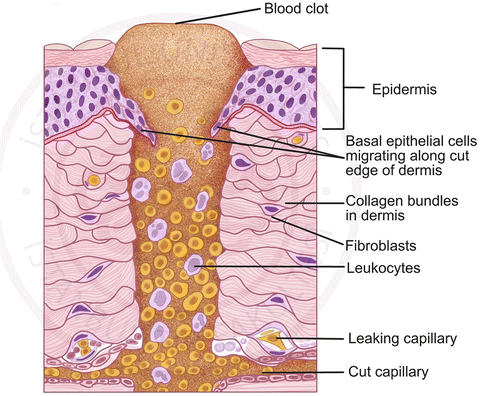
Remodelling Stage
Final stage of wound repair
Continuous indefinitely, from 3 weeks to years
Also known as “WOUND MATURATION STAGE”
Previous randomly laid down collage are destroyed & replaced by new collagen fiber of better orientation to resist tensile forces of the wound
The final process, which begins near the end of fibroplasia & continues during the early portion of remodelling, is wound contraction
During wound contraction, the edges of the wound migrate toward each other
Wound strength never reaches 80-85% of the strength of un-injured tissue
As wound metabolism lessens, vascularity is decreased, which diminishes wound erythema
...ALWAYS REMEMBER
Inflammatory Stage | Fibroplastic Stage | Remodelling Stage |
3-5 days | 5 days to 3 weeks | 3 weeks to years |
FACTORS THAT IMPAIR WOUND HEALING
Foreign Material
Necrotic Tissue
Ischemia – restriction of blood and oxygen supply
Wound Tension
Foreign Material
"Is anything that the host organism’s immune system views as “non-self
This includes bacteria, dirt, suture material, etc
Bacteria can proliferate and cause an infection in which bacterial proteins that destroys host tissue are released
Non-bacteria foreign material acts as haven for bacteria by sheltering them from host defences & thus promoting infections
Foreign material is often antigenic & can stimulate chronic inflammatory reaction that decreases fibroplasia
Necrotic Tissue
Serves as a barrier to the ingrowth of reparative cells; prolonging the inflammatory stage since the white blood cells fail to remove the necrotic debris
Serves as a protected niche for bacteria
This frequently includes blood that collects in a wound (hematoma), where it can serve as an excellent nutrient source of bacteria
:Example of Necrotic Tissue secondary to extraction*

Ischemia
(Decreased blood supply & oxygen delivery to a wound.(Black or Bluish on color
Result to further tissue necrosis - Lessen delivery of antibodies, white blood cells, and antibiotics to the wound
:Caused by
Tight or incorrectly placed sutures
Improperly designed flap
Excessive external or internal pressure on a wound
Systemic hypotension
Peripheral vascular disease
Anemia
:Example of ischemia of oral tissue*

Wound Tension
Tension from sutures cause tissue strangulation, producing ischemia
If sutures are removed too early, wound under tension may re-open resulting to excessive scar formation and wound contraction
On the other hand, when sutures are left too long, the tract where the sutures ran will epithelize then leave a permanent disfiguring mark
HEALING BY PRIMARY INTENTION
Wound edges without tissue loss are places and stabilized in essentially the same anatomic position prior to injury
Wound repair occurs with minimal scar tissue
A theoretical ideal which is difficult to attain clinically
Generally used term to designate wounds which the edges are closely reapproximated
HEALING BY SECONDARY INTENTION
Implies that a gap between edges of incision or laceration or between bone or nerve ends after repair
Tissue loss prevents close approximation of wounds edges
Requires large amount of wound repair processes
Examples are extraction sockets, deep ulcers or large avulsive injuries
Healing of Extraction Sockets*
After extraction, the remaining empty socket consist of cortical bone (radiographically seen as the lamina dura) covered by torn periodontal ligaments, with a rim of epithelium (gingiva) at the coronal portion
The socket fills with blood, which coagulate and seals the sockets from the oral environment
:First week of healing
Inflammatory stage – White blood cells enter socket to remove contaminating bacterial & to begin break down of any debris left in the socket
Fibroplasia – ingrowth of fibroblasts and capillaries
Epithelium migrates down the socket wall until it reaches a level at which it contacts epithelium from the other side of the socket or when it encounters the bed of granulation tissue under the blood clot
Osteoclasts (Bone destroying cell) accumulate along crestal bone
:Second week of healing
Large amount of granulation tissue fill the socket
Osteoid deposition along the alveolar bone lining the socket
:Third-Fourth week of healing
Cortical bone continues to be resorbed from crest and walls of sockets
New trabecular bone is laid down across the socket
:4-6 Months
The cortical bone lining is fully resorbed, radiographically there is a complete loss of lamina dura
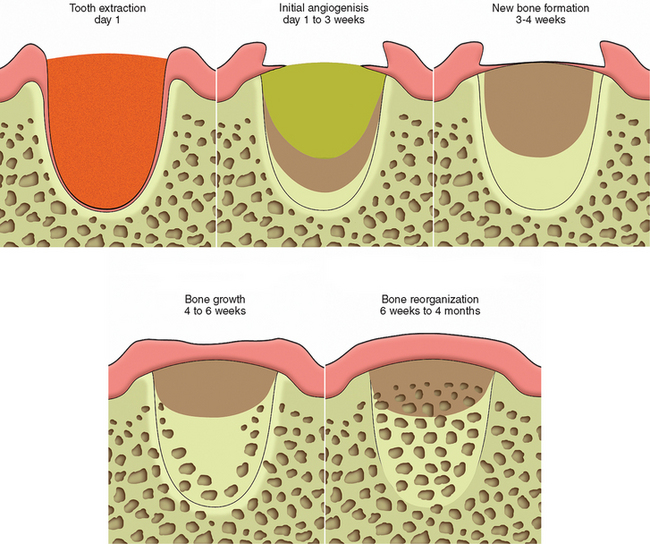
HEALING BY TERTIARY INTENTION
A term surgeon use to refer to wound healing through use of tissue grafts in large wounds
BONE HEALING
Bone heals by primary & secondary intention
If fracture ends are more than 1 mm or so apart, bone heals by secondary intention; wherein large amount of collagen must be laid down to bridge the bony gap
Fibroblasts and osteoblasts produce a lot of fibrous matrix such that healing tissue extends circumferentially beyond the free ends of the bone forming callus
Healing of bone by primary intentions occurs when bone is either incompletely fractured such that fracture ends does not become separated from each other,
Or when a surgeon closely re-approximates & rigidly stabilize fractured ends
In this case, little fibrous is produced & reossification of tissue within fracture area occurs quickly, with minimal callus formation
TWO FACTORS IMPORTANT TO PROPER BONE HEALING
Vascularity
If vascularity or oxygen supplies are sufficiently compromised, cartilage forms instead of bone
If either vascularity or oxygen supplies are poor, fibrous tissue does not chondrify or ossify
Immobility
Placing bone under continuous or repeated cycles of some tension stimulates continued osteoblastic bone formation
Bone is formed perpendicular to lines of tension to help withstand the forces placed on it
Excessive tension or torque placed on a healing fracture site produces mobility & compromises vascularity of the wound, promoting wound infection
IMPLANT OSTEOINTEGRATION
:Wound healing around dental implants; involves two basic factors
Healing of bone to the implant
Healing of alveolar soft tissue to the implant
HEALING OF THE BONE TO THE IMPLANT
This must occur before any soft tissue forms between the bone & the implant surfaces
:Four factors needed to achieve this
Short distance between implant & bone
Viable bone at or very near the surface of the bone along the implant
No movement of implant while bone is attaching to its surface
An implant surface free of contamination by organic or inorganic material. Including bacteria, oil, glove powder, foreign metals and foreign proteins
VIABLE BONY SURFACE ALONG THE IMPLANT
There should be minimized bone damage during site preparation to preserve the viability of the bone near implant surface
Much damage is caused by heat friction during cutting process
It is minimized by using sharp bone-cutting instruments, limiting cutting speeds to minimize frictional heat, & by keeping the bone cool with the irrigation during site preparation
Counter sinking implants & using low profile healing screws decrease chances of unwanted forces to be delivered to the implant
Covering the top of the implant during healing further protects it
?In implant, we use low-speed. Why*
Less torque to minimize damage to the bone & the healing capacity is intact
So that the drill keep on moving and penetrate the bone
FACIAL NEUROPATHY of TRAUMATIC ORIGIN
:The three branches of the trigeminal nerve injured most commonly
Inferior alveolar-mental nerve
Lingual nerve
Infraorbital nerve
types of nerve injuries
Neurapraxia
Axonotmesis
Neurotmesis
Neurapraxia
Least severe form of peripheral nerve injury
Contusion of a nerve in which continuity of the epineurial sheath and the axons is maintained
Blunt trauma or traction (e.g., stretching) of a nerve, inflammation around a nerve, or local ischemia of a nerve
No loss in axonal continuity, spontaneous full recovery of nerve function usually occurs in a few days or weeks
Axonotmesis
When the continuity of the axons but not the epineurial sheath is disrupted
Severe blunt trauma, nerve crushing, or extreme traction of a nerve
Because the epineural sheath is still intact, axonal regeneration can (but does not always) occur with a resolution of nerve dysfunction in 2 to 6 months
Neurotmesis
Most severe type of nerve injury
Complete loss of nerve continuity
Produced by badly displaced fractures, severance by bullets or knives during an assault, or by iatrogenic transection
Prognosis is poor except if the ends of the affected nerve have somehow been left in approximation and properly oriented
(NERVE HEALING (Two phases
Degeneration
a. Segmented demyelination
b. Wallerian degeneration
Regeneration
Segmented Demyelination
Myelin sheath is dissolved in isolated segments
This causes a slowing of conduction velocity and may prevent the transmission of some nerve impulses
:Symptoms
a. Paresthesia -a spontaneous and subjective altered sensation that a patient does not find painful
b. Dysesthesia -a spontaneous and subjective altered sensation that a patient finds uncomfortable
c. Hyperesthesia -excessive sensitivity of a nerve to stimulation
d. Hypoesthesia -decreased sensitivity of a nerve to stimulation
Occur after neurapraxic injuries or with vascular or connective tissue disorders*
Wallerian degeneration
Axons and myelin sheath of the nerve distal to the site of nerve trunk interruption' (away from the central nervous system) undergo disintegration in their entirety
Stops all nerve conduction distal to the proximal axonal stump
Occurs after nerve transection and other destructive processes that affect peripheral nerves
occurring after nerve trauma*
Regeneration
Normally the proximal nerve stump sends out a group of new fibers (the growth cone) that grow down the remnant Schwann cell tube
Growth progresses at a rate of 1 to 1 .5 mm/d and continues until the site innervated by the nerve is reached or growth is blocked by fibrous connective tissue or bone
Begin almost immediately after nerve injury*
Reference:
Lecture of Dr Reece Aldrin Valdez at national university college of dentistry- manila, philippines

برچسبها: Surgery
تا که بودیم نبودیم کسی، کُشت مارا غم بی همنفسی
تا که رفتیم همه یـــــار شدند، خفته ایم و همه بیــــدار شدند
قدر آئینه بدانیم چو هست، نه در آن وقت که افتاد و شکست
درحیرتم از مرام این مردم پست، این طایفه ی زنده کش مُرده پرست
تا هست به ذلت بکشندش به جفا، تا رفت به عزت ببرندش سر دست
آه میترسم شبی رسوا شوم، بدتر از رسواییم تنها شوم
آه از آن تیر و از آن روی کمند، پیش رویم خنده پشتم پوزخند
شعر: تا که بودیم نبودیم کسی اثر اقبال لاهوری
نقاشی: آفرینش آدم اثر میکل آنژ Michelangelo The Creation of Adam
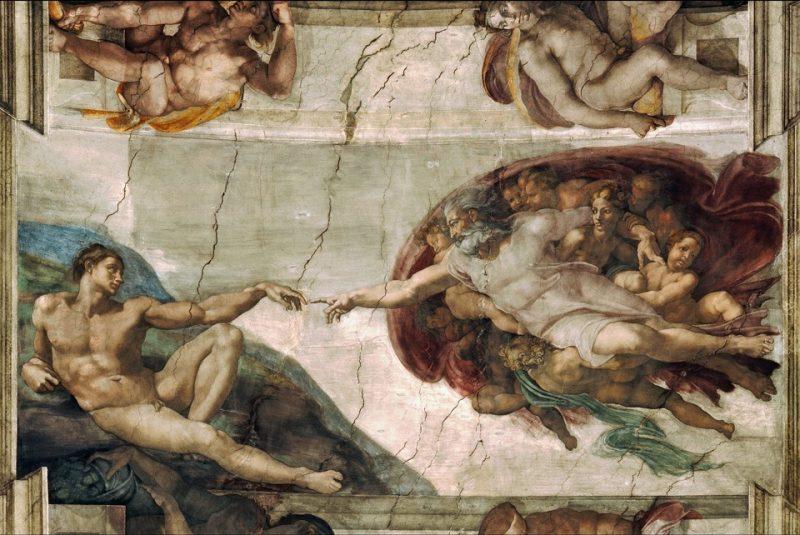
برچسبها: شخصی
کتاب هاکلبری فین
زندگی در خانه خیلی خوب است، اما در قایق احساس آزادی و راحتی بیشتری می کنی.
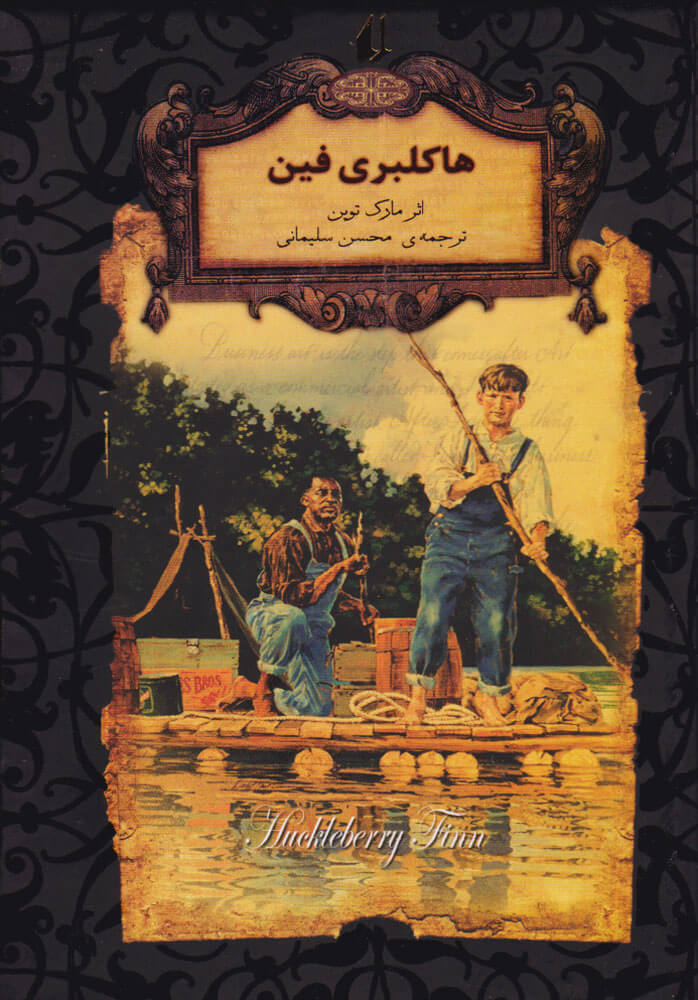
برچسبها: شخصی
آیا ما قبلاً یکدیگر را ندیده ایم؟ جایی در یک موسیقی ؟
نقاشی: رقص با موسیقی زمان اثر نیکولاس پوسن Nicolas Poussin A Dance To The Music Of Time

برچسبها: شخصی
من همه را میبینم اما، تو را نگاه مینم
نقاشی: عاشق تاج گذاری کرد اثر ژان هونوره فراگونارد Honoré Fragonard The lover crowned

برچسبها: شخصی
